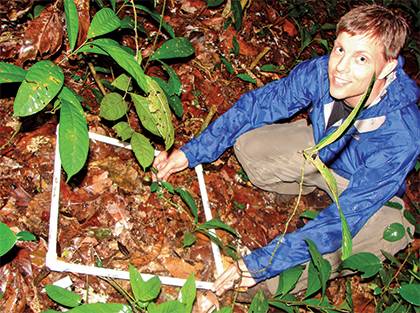Bringing Africa to Duke
John Poulsen's fieldwork in Gabon, Africa, informs his ecological research at Duke

Name: John Poulsen
Position: Assistant Professor of Tropical Ecology, Nicholas School of the Environment
Years at Duke: 1.5
What I do at Duke: I study tropical forests, with a focus on understanding how land-use strategies that provide development opportunities for African nations (like logging, mining and oil palm production) impact their biodiversity and ecosystem services, such as the ability to sequester carbon. I train Ph.D. and master's students so that they have the research skills and knowledge to engage in biodiversity conservation and sustainable management of tropical forests. I spend my summers and a several weeks of term time in Gabon, Africa, where I do my fieldwork and serve as an advisor to the national government.
What I miss about Africa when I'm in Durham: I miss the rawness of Africa. Everything seems amplified there. The trees are taller, the weather is muggier, the animals are wilder, the people are more colorful and more exuberant.
To start a conversation with me, ask about: Development challenges in Africa, or fly-fishing.
My first paid job: I was a wild lands firefighter in Montana.
When I'm not at work I like to: Spend time with my 4-year-old son, Teodros. We take hikes in Duke forest, visit the science center, play with Legos, and sometimes he lets me catch a Duke basketball game on TV.
A superpower I'd like to have: I think I would choose teletransport so that I could move instantaneously from Duke to Africa or elsewhere in the world.
What I would do with $5 million: I would buy a small cabin in Montana. The rest I would contribute to developing innovative strategies for combatting elephant poaching and reducing demand for ivory. It disturbs me to think of a world where elephants can't roam freely, and what might happen to ecosystems if elephants aren't roaming freely.
Something most people don't know about me: I speak Fulfulde, an African language, pretty fluently. And I spent nearly three years living in a tent, 30 km from the nearest road or village, with no phone, internet, computer, running water, or electricity.
A memorable moment at Duke: When I came for my job interview I stayed at the Washington Duke Inn. Unbeknownst to me, there was an alumni basketball tournament or conference. I remember sitting in the lobby thinking, 'North Carolinians are freakishly tall.'
What I love about Duke: Conversations are rarely dull! I find it inspiring how many people I meet are applying their talents to resolving real word problems.
What I am reading: I just finished "The Reason I Jump: The Inner Voice of a Thirteen-Year-Old Boy with Autism" by Naoki Higashida.